Syria gives Russia 'new evidence' on chemical attack
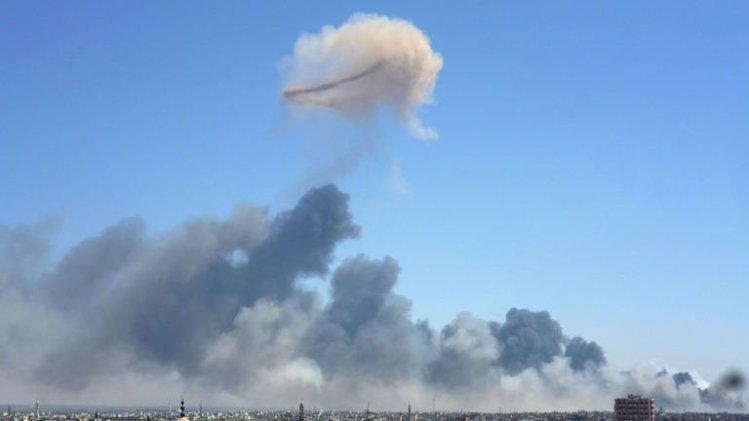
Despite a weekend agreement between the United States and Russia aimed at dismantling Syria's chemical arsenal by mid-2014, the two sides remained at loggerheads in their assessment of the August 21 gas attack which left hundreds dead.
US President Barack Obama said it was "inconceivable" that anyone other than the Syrian regime could have carried out the attack but Russia defiantly kept to its past suspicions that the rebels could be to blame.
Russian Deputy Foreign Minister Sergei Ryabkov said Wednesday after the first of two days of talks in Damascus the Syrian regime has handed Russia new materials implicating rebels in the chemical attack.
"The corresponding materials were handed to the Russian side. We were told that they were evidence that the rebels are implicated in the chemical attack," Ryabkov was quoted as saying by Russian news agencies after talks with Syrian Foreign Minister Walid al-Muallem late Tuesday.
He said that Russia would "examine the Syrian materials implicating the rebels with the utmost seriousness".
To the fury of the West, Russia has repeatedly expressed suspicion that the chemical attack was a "provocation" staged by the rebels with the aim of attracting Western military intervention in the conflict.
Ryabkov also said Russia was disappointed with the report into the chemical weapons attack published by UN inspectors this week, saying it was selective and had ignored other episodes.
"Without a full picture... we cannot describe the character of the conclusions as anything other than politicised, biased and one-sided," he said.
Ryabkov is on a visit to Damascus to emphasise to the Syrian regime the importance of implementing "swiftly and strictly" the agreement between Moscow and Washington to rid Syria of its chemical weapons.
The United States and its allies maintain the attack was carried out by Syrian government forces, and believe the assessment released by UN experts released on Monday backed their view.
"When you look at the details of the evidence they present -- it is inconceivable that anybody other than the regime used" the chemical weapons, US President Barack Obama said Tuesday of the UN report.
The report helped "change the international dynamic" on the issue, he claimed in the interview on the Spanish language Telemundo network.
The State Department earlier accused Russia of "swimming against the tide" of both international opinion and the facts about the attack.
Diplomats have said that France and Britain are preparing a draft resolution at the United Nations that will demand a threat of sanctions if Assad does not comply with the chemical disarmament plan.
UN chief Ban Ki-moon is to meet with the foreign ministers of the five key nations in New York on the sidelines of the UN General Assembly, and three days later, with the top diplomats of the US and Russia, to help resolve the Syria crisis, he said Tuesday.
Ban said the attacks with banned chemical weapons were only the "tip of the iceberg," and urged the major powers to take a "broader" look to tackle the fighting as well as the humanitarian strife.
The United Nations permanent Security Council members held new negotiations on Tuesday on the wording of a resolution to back the Russia-US accord.
Diplomats said ambassadors discussed a French text which included a demand for action under Chapter VII of the UN Charter -- which allows the use of force and tough sanctions -- if Assad does not stick to the plan.
But Ryabkov said he assured the Syrian side that there was "no basis" for a UN Security Council resolution on the chemical weapons agreement to invoke Chapter VII.
He said this could only be considered if the UN Security Council was able to confirm violations of the convention on chemical weapons. "This is a hypothetical situation."
"It is especially important that some kind of political interests do not again appear, especially in New York (at the UN Security Council)," he added.
Yet Washington insisted Tuesday a Chapter VII resolution remained an option under the terms of the weekend agreement.
The United States had moved to the brink of a military strike on Syria after blaming Assad's regime for the attack which it said left 1,400 people dead.
The strike however was put on hold last week as Syria agreed to a fast-track accession to the international convention banning chemical weapons, formally agreed by the US and Russia in Geneva.
The 30-month long conflict in Syria has killed more than 110,000 people, according to rights groups, and refugees have flooded countries in the region and beyond.





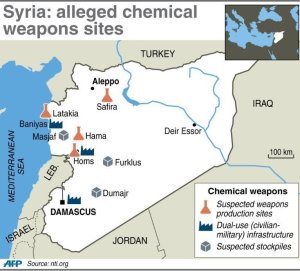
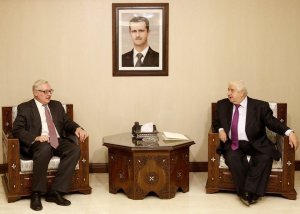
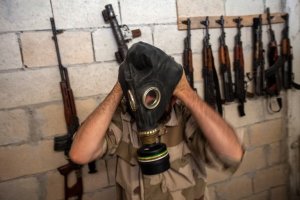
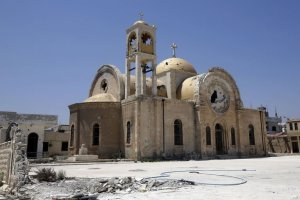
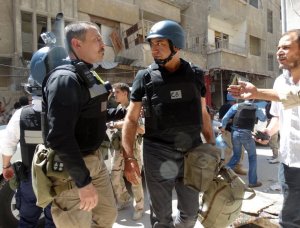
ไม่มีความคิดเห็น:
แสดงความคิดเห็น